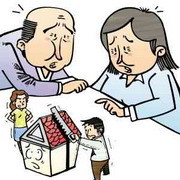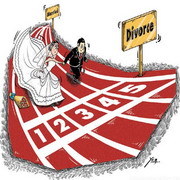Photos
Love or property?
Updated: 2011-08-17 16:32
(chinadaily.com.cn)

A judicial interpretation of China's Marriage Law regarding the settlement of property disputes upon divorce came into effect on Saturday, triggering hot discussion among Chinese netizens.
Real estate was before regarded as the shared property of a married couple even if it was given by the parents of one party. But according to the new interpretation issued by China's Supreme People's Court, a house bought by parents will go to their child instead of being split between the couple in case of a divorce. And if the parents of both partners have paid jointly for the property, the two sides should negotiate on how to divide the ownership.
As people become richer and more materialistic, having one's own flat has become a major criterion when choosing a spouse. Most people find it risky and unacceptable to tie the knot without a flat, which is jokingly called a "naked marriage". Will the new interpretation change marriage values? Isn't it unfair to women in the event of divorce? Will it result in an increase in divorce rates?

@Xu Canrong
The new judicial explanation of the Marriage Law is a caution to all girls: don't set your heart on marrying a boy who owns a car and a house any longer. Once you get divorced, you will get nothing. Even if you add your name under the registration of the house after marriage, it cannot deny your husband's sole ownership of it. Therefore, it is securer to find a husband without any car or house and make down and mortgage payments together with him.

@Chinese Entrepreneurs
There is a saying that "girls are to attract while boys are to invest", which makes many boys' parents very stressful. However, the new judicial explanation sets them free, because they no more need to take precautions against their daughters-in-law. The interpretation tells women that both men and their houses are not dependable, and their parents are even more unreliable - for women, it's safest to depend on themselves!

@Chunxiaqiudongdeshiguang
I think its issue will surely result in an increase in divorce rates, because more men than women want to get divorce in our contemporary society. For many families, the ownership of property was the only stipulation to tie down a man and maintain marriage, but now even that will not exist and men will be able to change their lovers without scruple.

@Wang Fusheng
It is a testament to the fragility of once-stable marital relations in modern life, where people are getting more and more realistic and turning the base of marriage from an emotional connection into a business partnership. Does it mean progressing or regressing?

Liang Yali, a Beijing lawyer
"Judging from China's real situation, when a man and a woman get married, it is often the man's responsibility to provide a house, which is basically sponsored by the man's parents. If the couple gets divorced, the woman is entitled to a share of the value of the house, which is unfair indeed to the man's parents who spend their whole life's savings on their son's house."

@Xixi
As the rates of cohabitation and divorce keep stubbornly high, more disputes also come up. It is necessary to take a legislative measure to define the ownership of property and settle disputes. The issue of this regulation can effectively prevent unjust gains from marriage and protect the rights of married couples and their parents.

@Oliva
In many foreign countries, women can get alimony after divorce until they get married again. In Japan, women can even get 70 percent of the property value if divorced. Despite its seeming unfairness, it can effectively maintain the stability of families. And according to Japan's newly-revised Marriage Law, wives who file for divorce can get half of her husband's retiring pension. We can learn from this solution.

Specials

Biden Visits China
US Vice-President Joe Biden visits China August 17-22.

Star journalist leaves legacy
Li Xing, China Daily's assistant editor-in-chief and veteran columnist, died of a cerebral hemorrhage on Aug 7 in Washington DC, US.

Robots seen as employer-friendly
Robots are not new to industrial manufacturing. They have been in use since the 1960s.